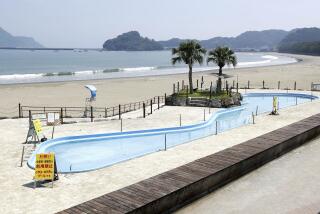Japanese fearful as nuclear crisis builds
- Share via
Reporting from Fukushima, Japan -- — They’re scared. And they’re skeptical.
The government in Tokyo may be reassuring a nation already reeling from the worst earthquake in its recorded history that Japan is not about to experience a full-blown nuclear disaster.
But the closer you got to the Fukushima nuclear complex, where officials are struggling with the specter of meltdowns at two of its six reactors, the less people were buying it.
Photos: Scenes from the earthquake
On National Road 4 on the city’s outskirts, Mari Kano was crawling through congested traffic Sunday morning with her two young children in tow, baskets of clothes and toys in the back of her station wagon.
“I’m extremely worried about this nuclear leakage, especially with children,” the 33-year old homemaker said. “We live 12 miles from the reactors. We’ve left our home to stay with my parents. At this point, we have no idea how long it might be before it will be safe to return.”
The Japanese have an uncomfortable relationship with nuclear power. The country relies heavily on nuclear energy for electricity; with 55 plants, they have more than any country other than the United States and France. But Japan is also the only country to ever be the victim of an atomic attack, and the psychological weight of the bombings of Hiroshima and Nagasaki adds a sense of dread to the embrace of nuclear power.
Outside Fukushima, a Super Viva housewares store was mobbed by people buying up flashlights, batteries, water and pumps. They feared aftershocks, but they also feared disaster at the nuclear complex.
“I’m so scared,” Kin Anzawa, 75, said, bent to the waist and looking to buy tape “to keep things from falling.”
“There’s nobody to help us.”
And many did not trust the authorities were telling them everything they know.
An electrician struggling against the tide of fleeing residents to get to Fukushima to work on various power-related problems said he had his doubts.
“We need them to be more honest,” said Kuni, 43, who declined to give his first name. “They may be telling the truth. They may not. We really don’t know.”
Ken Sasaki, 40, a construction ministry official manning a roadblock, said the images on television of the reactor building’s top blown off didn’t engender great confidence.
“Personally, nuclear power makes me a bit nervous,” he said. “But as a nation, I still think we need it.”
Since Friday’s devastating quake, Tokyo Electric Power Co., which operates the Fukushima facility, has been trying to prevent meltdowns at the complex. The government has issued evacuation orders for a 12-mile zone around the complex, affecting an estimated 180,000 people.
As many people here are well aware, the company, known as Tepco, has a history of not being forthcoming about nuclear safety issues, particularly those surrounding earthquake-related dangers. In 2003, all 17 of its nuclear plants were shut down temporarily after a scandal over falsified safety-inspection reports. It ran into trouble again in 2006, when it emerged that coolant-water data at two plants had been falsified in the 1980s.
Critics have long expressed deep concern about safety at many of Japan’s nuclear facilities, some which date back to the 1970s and 1980s. Fukushima has long been on critics’ radar, but so has the Hamaoka plant, just 100 miles southwest of Tokyo, which perches on an active fault line.
“I have been warning about Japan’s possibility of a genpatsu shinsai — a nuclear disaster,” said Katsuhiko Ishibashi, a seismologist and professor emeritus at Kobe University. He said Fukushima was only one of a number of nuclear complexes in seismically unsafe locations.
On Sunday, a series of cooling malfunctions forced authorities to resort to the drastic measure of pumping seawater into reactors to keep them from melting down.
“We are trying to get our power back, and we are looking at several options that are available to us to regain power,” Japan’s Nuclear and Industrial Safety Agency said. “We are going through the process step by step.”
On Sunday morning, national broadcaster NHK reported that nine more people had tested positive for high levels of radiation, adding to the three cases reported Saturday.
Even those not living directly in the shadow of the Fukushima complex were anxious.
Photos: Scenes from the earthquake
“Well, the plants are 31 miles from my house, so it’s not so worrisome,” said Junichi Yamaki, 63, a retiree. “But the lack of clear information from our leaders is disturbing. I think they’re doing that to try and reduce panic, but it could do the opposite. I need to know more from them.”
The fears of a nuclear disaster on top of a catastrophic quake seemed too much to bear.
“Just when we escaped from the earthquake, we learned that there was radiation,” said Hideyuki Shimizu, a 24-year-old medical student who was on a train in Fukushima when the quake struck. “Maybe right now we’re not in danger, but we don’t know what’s going to happen next.”
Times staff writer Laura King and special correspondent Kenji Hall in Tokyo contributed to this report.
More to Read
Sign up for Essential California
The most important California stories and recommendations in your inbox every morning.
You may occasionally receive promotional content from the Los Angeles Times.










